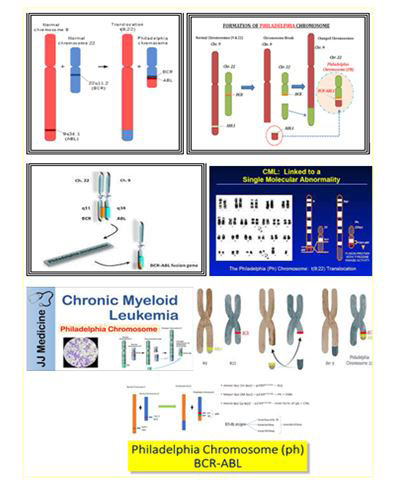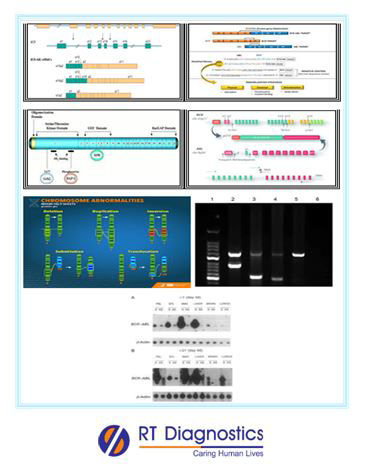BCR- ABL –RNA- Transcripts:
Why BCR-ABL – RNA Transcripts test?
CLINICAL INFORMATION :
BCR-ABL – RNA Transcription test is performed to detect Philadelphia chromosome and BCR-ABL 1 fusion gene or its transcripts, which are RNA copies made by the cells from those abnormal stretches of DNA (genes). The presence of RNA transcripts or Philadelphia chromosome and abnormal BCR-ABL 1 fusion gene confirms the diagnosis of leukemia. BCR-ABL molecular defect is screened for tumor marker as a tool of diagnosis. Molecular methods such as fluorescence in-situ hybridization (FISH), reverse transcriptase-polymerase chain reaction (rtPCR), and real-time quantitative rtPCR can be used to detect the chimeric BCR-ABL gene or transcripts. Other tests include southern blot, amplification technology, gene expression profiles, and microarray analysis, etc. BCR-ABL – Philadelphia Chromosome testis performed to detect Philadelphia chromosome and BCR-ABL 1 chimeric fusion genes or its transcripts for RNA synthesized from abnormal stretches [fusion of two long arms of chromosome t(9;22)] of DNA due to genetic mutation on these specific chromosomes i.e 9 and 22 break (P210 v/s P190 breakpoint - cluster region) and switch places (reciprocal translocation). This mutation occurs when pieces of chromosome 9 have attached to chromosome 22[t(9;22)(q34;q11)]. This abnormal mutated chromosome 22 is called Philadelphia chromosome because it is in this place researchers first discovered it. BCR-ABL 1 fusion genes are translated into 210 kD (p210) or 190 kD (p190) BCR-ABL fusion product with significantly enhanced dysregulated tyrosine kinase activity. Thus it shows up in patients with certain types of leukemia, cancers of the bone marrow, and WBCs. BCR-ABL 1 fusion genes are almost found in all patients with leukemia called myelogenous leukemia or chronic myeloid leukemia (CML). In some cases of acute lymphoblastic leukemia (ALL) and myelogenous leukemia (AML) also this BCR-ABL 1 fusion genes are found involved. Bone marrow aspiration biopsy is needed for the confirmatory studies. Hence the presence of BCR-ABL1 abnormality confirms the clinical diagnosis of all CML cases, Ph+ ALL or Ph Positive ALL cases, and in a few AML cases also. Few causes and risk factors are smoking, exposure to radiation or certain chemicals, family history, genetic disorders, Clinical manifestations include fever, chills, persistent fatigue, weakness, frequent or severe infections, weight loss, swollen lymph nodes, enlarged spleen, and/or/both liver (hepato-splenomegaly), easy bleeding on bruising, recurrent nose bleeds, seizures, night sweats, headache vomiting, shortness of breath and petechial rashes (red spots on the skin). Other tests include blood tests (complete blood count), bone marrow biopsy, spinal tap (to check for metastasis to the brain), imaging studies like CT, MRI, and PET Scans, etc.


General instructions:
Sample Requirement: Specimen - collected from the bone marrow. Test Preparation: None.
NOTE - Sample for specimen collections may vary based on the patient’s condition/cases according to the patient’s presenting complaints/signs or symptoms:
SPECIMEN REQUIREMENT (Special or Rare Cases) - As instructed and guided by Physician / Clinician / Pathologist / as per Laboratory’s requirements, according to procedures and protocols.
This Multi-Specialty Clinical Referral Laboratory RTDIAGNOSTICS provides precise and accurate tests with an extensive range of testing services to the medical centers to help in the diagnosis and identification of pathology in the test specimens for infectious diseases and also to evaluate the function of organ systems of the patient. It prevents further complications and helps to stabilize and restore health to near normalcy at the earliest without delay.



